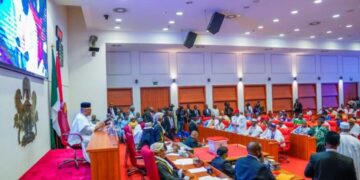The Minister of Innovation, Science, and Technology, Chief Uche Nnaji, announced that the Federal Government will soon begin regulating and licensing players in the space ecosystem to boost revenue generation. He made the statement during the inauguration of the Advanced Unmanned Aerial Vehicles Laboratory at the National Space Research and Development Agency (NASRDA) in Abuja on Thursday. The lab’s opening is part of activities marking Nigeria’s 25th anniversary in space.
Nnaji highlighted the role of satellite technology in addressing illegal activities across sectors such as oil and gas, explaining that it can be used to monitor issues like pipeline leakages, vandalism, and even ship activities in Nigerian ports. He noted that over 80% of ships entering the country’s ports evade paying bunker fees by turning off their engines, a practice that could be tracked using satellites. He emphasized that satellites could also enhance agricultural monitoring and provide valuable insights into earth movements.
He added, “Very soon, we will begin regulating and licensing the space sector, including the upstream, mainstream, and parts of the downstream. This is a significant achievement and is happening under President Bola Tinubu’s administration.”
NASRDA’s Director-General, Matthew Adepoju, also spoke at the event, underscoring the agency’s focus on deploying space spin-offs and actively engaging the private sector to develop the space ecosystem. He mentioned that turning research and innovations into products and services that benefit Nigeria’s economy is a top priority. Adepoju further discussed how space technology could impact key sectors like security and agriculture, and noted that NASRDA is collaborating with Nigeria Communication Satellite Limited and the Defence Space Administration to strengthen the country’s space capabilities.
Adepoju said, “One of our core mandates is to build indigenous capacity in satellite technology, astronomy, and all aspects of space science, which includes the AUAVL. UAVs, or drones, have become a key tool for environmental monitoring and precision agriculture.”
The Director and Coordinator of the AUAVL, Chichebe Akachukwu, explained that the drones used by the agency are designed for precision agriculture, surveillance, and pipeline monitoring. He added that the materials for the drones are locally sourced, while some parts are built abroad based on the required specifications.
“We have drones capable of long-distance missions for surveillance and pipeline monitoring. Precision agriculture helps optimize harvests while reducing energy consumption,” Akachukwu said.
He also mentioned that while the agency already has a lab in Abakaliki, Ebonyi State, the new Abuja facility will provide easier access for collaborators within the Federal Capital Territory.
The event’s highlight was the launch of NASRDA’s International Journal of Space Technology and Earth Sciences, presented by the Permanent Secretary of the Ministry of Innovation, Science, and Technology, Mrs. Esuabana Nko-Asanye.







